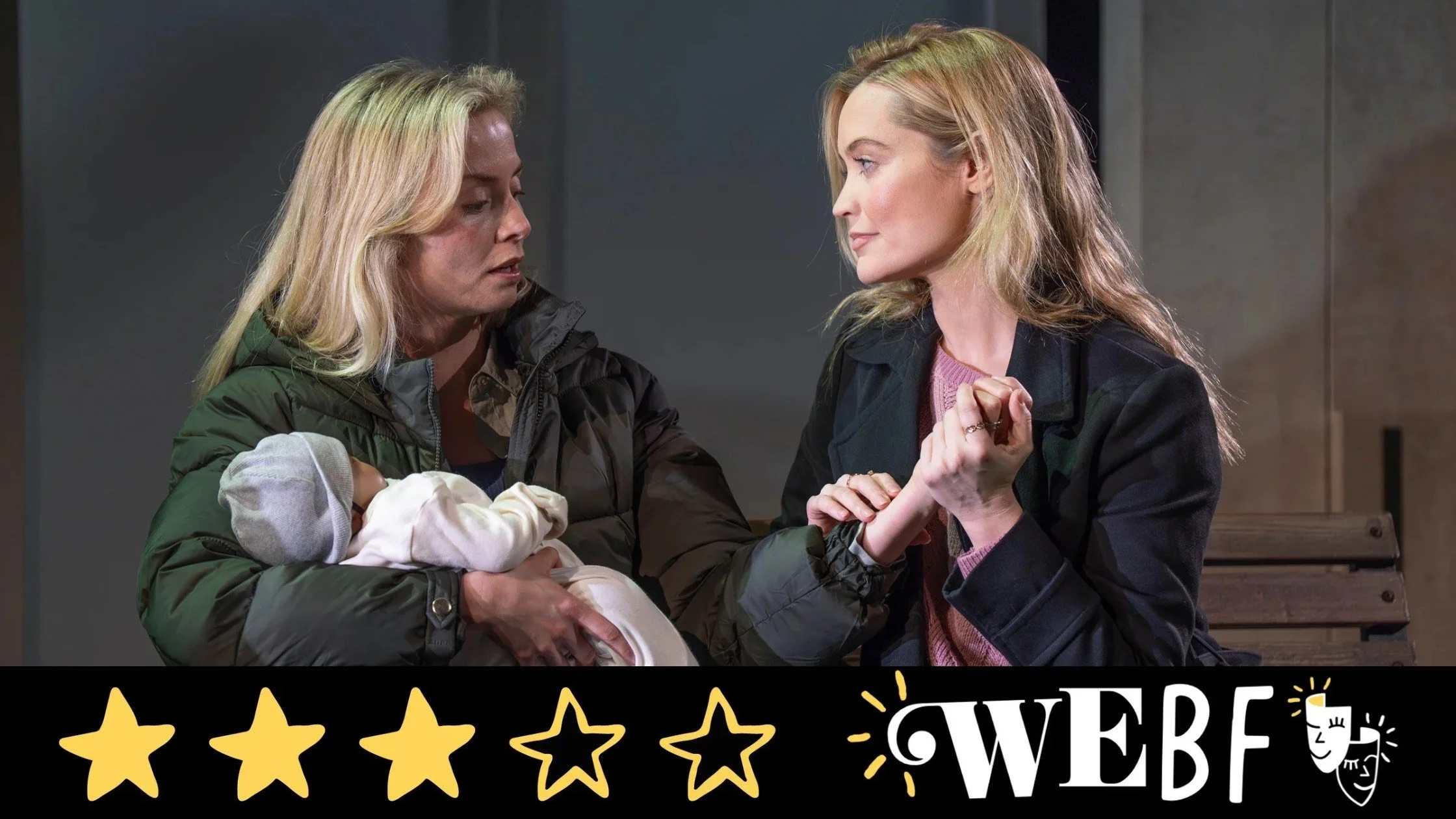Review: APEX PREDATOR, Hampstead Theatre
Photo credit: Ellie Kurttz
John Donnelly’s Apex Predator straddles multiple genres, blending supernatural horror with current social commentary. It’s a darkly entertaining exploration of power, repression, and the lengths we go to when we feel powerless. Director Blanche McIntyre, who recently staged The Invention of Love at Hampstead Theatre, shifts gears here, moving from intellectual complexity to a production that is more immediately accessible. The result is an entertaining, if slightly uneven, supernatural thriller that lingers just enough to unsettle.
Set in contemporary London, the story follows Mia (Sophie Melville) who is struggling with a loss of control and an increasingly unsettling outlook on the world. Stuck in a claustrophobic flat with a newborn who won’t stop crying, basically, she’s running on fumes. Her son, Alfie (Callum Knowelden for press night but sharing the role with Lorcan Reilly), is being bullied at school; her husband, Joe (Bryan Dick), is distant due to secretive work responsibilities, while their inconsiderate neighbour keeps her up at night with relentless music. Meanwhile, dead bodies keep surfacing in the Thames, fueling an underlying sense of unease.
Amidst this chaos, Alfie’s primary school teacher, Ana (Laura Whitmore), introduces Mia to a radical form of self-empowerment, one that involves crossing a line between the hunter and the hunted. What begins as an act of survival transforms into something far more sinister, forcing Mia to confront just how far she’s willing to go for control. And what better vehicle for such a story than vampires!
Is Apex Predator a kitchen sink drama? A horror? A comedy? The play ambitiously attempts to be all three, delivering an accessible yet eerie exploration of contemporary anxieties. Vampires have been depicted in every conceivable way throughout literature and pop culture, so why not as a metaphor for modern disillusionment? Donnelly’s play takes this familiar mythology and roots it in the everyday struggles of motherhood, gender dynamics, and the hunger for control.
At its core, Mia’s rage reflects a wider societal unease, an underlying distrust of the world and a frustration with her own perceived powerlessness. She’s not a particularly complex character, nor does she come with an extensive backstory. We learn only that she’s led a relatively ordinary life, one now disrupted by motherhood, which gives her purpose but doesn’t stop her gnawing dissatisfaction with feeling weak. Her husband, Joe, is similarly sketched with broad strokes, serving more as an obstacle in Mia’s path than a fully developed character.
Although the writing keeps Mia somewhat vague, Melville brings intensity to her, capturing the character’s descent from exhausted mother to something far more dangerous. She is fun and foul-mouthed, making her relatable, with a fire that is not completely extinguished. Whitmore’s Ana balances warmth with something altogether more unsettling, her demeanour well suited to the role. Together, they create an anti-heroic duo that is both compelling and unpredictable. The cast, overall, holds the work well, with multi-roler Leander Deeny clearly enjoying himself in the feasting frenzy.
The physicality of the piece effectively contrasts reality with the supernatural, using subtle shifts in the performers' statures and movement quality to reflect this. Undoubtedly influenced by movement director Ingrid Mackinnon, these choices help position the play in a liminal space between genres.
Despite the strengths of its cast, the production stumbles in its design. The cramped, realistic kitchen set, while effective for domestic scenes, struggles to blend into the background as the play’s other settings, such as the park and school, awkwardly unfold around it. Scene transitions feel inconsistent and visually intrusive, often disrupting the flow rather than enhancing it. The staging choices occasionally make the audience work too hard to suspend disbelief. There seems to be symbolism in the excess of the design but it doesn’t fully translate.
Nevertheless, Apex Predator is an engaging watch. It might not dig as deep as some might hope, but it offers enough brooding atmosphere, sharp dialogue, and unexpected moments to keep audiences hooked. It certainly leaves viewers questioning: is Mia’s anger justified? And if given the chance, how far would any of us go to reclaim a sense of power?
*** Three stars
Reviewed by: Stephanie Osztreicher
Apex Predator plays at London’s Hampstead Theatre until 26 April, with further info here.


